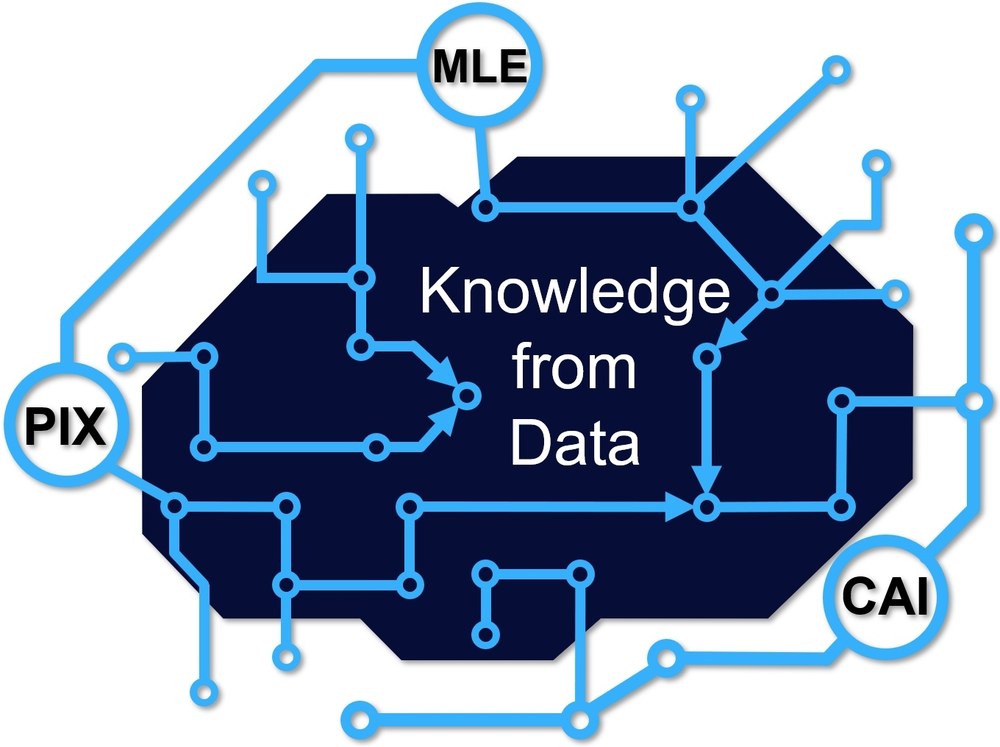Data Analysis and Intelligence
The main goal of the Department of Data Analysis and Intelligence is to generate knowledge from data and develop a deeper understanding of complex datasets and the associated processes. We develop data-driven approaches to gain insights and make informed.
The department boasts a comprehensive portfolio of innovative data analytic methods encompassing machine learning, artificial intelligence, causal inference, and techniques for integrating physical knowledge and process understanding. From developing cutting-edge algorithms to integrating domain expertise, we aim to unlock the full potential of data. To effectively pursue our goals, the department is divided into three groups: Machine Learning, Causal Inference, and Process Knowledge Integrating Data Exploration. In the department, we continuously work on evolving our methods and adapting them to new domains.
Machine learning
The main task of the Machine Learning Group (MLE) is to promote and advance the introduction and integration of machine learning methods in both internal and external applications within DLR. MLE provides comprehensive support for the implementation of these technologies and drives the development of methods specifically tailored to real-world scenarios in aerospace, aviation, and transportation. MLE focuses on developing and implementing strategies that enable the effective use of machine learning methods, working closely with domain experts from various DLR application areas to meet the specific requirements of the given applications.
A significant focus of our research lies in the practical applicability of various aspects of machine learning. Core topics include anomaly detection, especially in sequential data, model interpretability and prediction explanation, uncertainty quantification, and model robustness to changes in input data.
We work intensively on anomaly detection in time series data in order to monitor the systems there by looking at sensor data, for example. If abnormal or unexpected behavior is detected, users can intervene if necessary, e.g. to prevent system failures or identify maintenance requirements. Within the EDEN Next Gen and EDEN Next Gen Phase II projects, for example, we take on important tasks in the detection and categorization of anomalies in telemetry data from bioregenerative life support systems, which are necessary for the life of astronauts in habitats in space. We are also conducting research in the field of sensor AI, which involves specific requirements for the robustness of the methods and hardware resources. In particular, we focus on methods for quantifying uncertainties and improving the explainability of models and predictions. In this way, we actively contribute to the further development and adaptation of machine learning methods to make them more powerful and relevant for practical DLR applications, with the aim of generating successful transfer services.
Process Knowledge Integrating Data Exploration
The Process and Knowledge Integrating Data Exploration group envisions bridging process knowledge with data analysis to foster data-driven decision-making. Their methods include seamlessly integrating domain and process knowledge into data exploration, particularly through time series data analysis, integration of physical models, and the development of image pattern recognition techniques.
These approaches enable gaining practical insights with direct value to industries such as aviation, space, and energy. The group utilizes data-driven decomposition of time series into different frequency spectra for detecting cyclic patterns and trends and subsequently characterizing individual signal components. Additionally, the group focuses on integrating physical models into data analysis to enable holistic and precise interpretation of complex systems, such as sound propagation under the influence of inhomogeneous flows in the VIRLWINT project. Our research also includes innovative and transferable image pattern recognition methods, including the identification and characterization of ionospheric anomalies in SAR data in the PLASMA project. We develop sophisticated algorithms for analyzing point cloud data and knowledge-based derivation of complex, practical parameters, including from UAV data, for transfer projects in forestry (SHADOW), in permafrost (UCEA) and dyke monitoring (RESIKOAST).
The group relies on evidence-based methods to continually expand process understanding. Additionally, it aims to pool the competencies of all stakeholders to identify trends in research and development needs early and successfully implement innovative technologies. The group is also engaged in proactive acceptance research methods to increase acceptance of their solutions by ensuring the participation of all stakeholders and considering human factors, as seen in projects like VIRLWINT and THOR.
Causal inference
The goal of the Causal Inference group is to contribute to a data-driven understanding of complex dynamic processes. To achieve this, the group develops theory, methods and software in the field of causal inference for applications within and beyond DLR. Causal inference, at the intersection of statistics and machine learning, is an active field of research that develops methods and algorithms for the data-driven derivation and analysis of cause-and-effect relationships. Causal inference thus goes beyond the analysis of mere statistical dependencies. In combination with machine learning, causal inference also has the potential to increase the robustness and generalisability of the learned models.
In its research and development work, the group follows an application-driven approach. This means, firstly, close collaborations with the respective domain experts in the conception and implementation of applications for causal inference. Secondly, we identify the challenges that arise in these applications and address these challenges through targeted further development of our method portfolio. A special focus of the group is on time series data.
Our methods are used in various areas of DLR and beyond. Examples include the analysis of causal relationships in the field of space weather as part of the PLASMA project and the explanation of anomalies as part of the CausalAnomalies project with a wide range of applications within DLR, e.g. in the field of unmanned aerial vehicles and transport infrastructure.
In the field of Quantum Computing, the group combines quantum machine learning with high-performance computing, for example in the QCoKaIn project.

